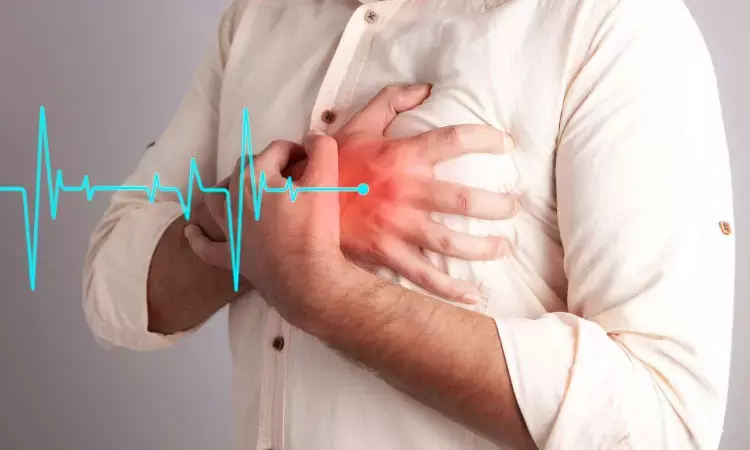- Home
- Medical news & Guidelines
- Anesthesiology
- Cardiology and CTVS
- Critical Care
- Dentistry
- Dermatology
- Diabetes and Endocrinology
- ENT
- Gastroenterology
- Medicine
- Nephrology
- Neurology
- Obstretics-Gynaecology
- Oncology
- Ophthalmology
- Orthopaedics
- Pediatrics-Neonatology
- Psychiatry
- Pulmonology
- Radiology
- Surgery
- Urology
- Laboratory Medicine
- Diet
- Nursing
- Paramedical
- Physiotherapy
- Health news
- Fact Check
- Bone Health Fact Check
- Brain Health Fact Check
- Cancer Related Fact Check
- Child Care Fact Check
- Dental and oral health fact check
- Diabetes and metabolic health fact check
- Diet and Nutrition Fact Check
- Eye and ENT Care Fact Check
- Fitness fact check
- Gut health fact check
- Heart health fact check
- Kidney health fact check
- Medical education fact check
- Men's health fact check
- Respiratory fact check
- Skin and hair care fact check
- Vaccine and Immunization fact check
- Women's health fact check
- AYUSH
- State News
- Andaman and Nicobar Islands
- Andhra Pradesh
- Arunachal Pradesh
- Assam
- Bihar
- Chandigarh
- Chattisgarh
- Dadra and Nagar Haveli
- Daman and Diu
- Delhi
- Goa
- Gujarat
- Haryana
- Himachal Pradesh
- Jammu & Kashmir
- Jharkhand
- Karnataka
- Kerala
- Ladakh
- Lakshadweep
- Madhya Pradesh
- Maharashtra
- Manipur
- Meghalaya
- Mizoram
- Nagaland
- Odisha
- Puducherry
- Punjab
- Rajasthan
- Sikkim
- Tamil Nadu
- Telangana
- Tripura
- Uttar Pradesh
- Uttrakhand
- West Bengal
- Medical Education
- Industry
Unprocessed Red Meat, Processed Meat consumption Linked to Ischemic Heart Disease

According to results from a recent cohort research, processed and unprocessed red meat have certain metabolomic signatures that are linked to an elevated risk of ischemic heart disease (IHD).
The research was led by first author Xue Dong, MD, of the department of epidemiology and biostatistics in the School of Public Health at Peking University in Beijing, and colleagues. "The results obtained from observational and genetic analyses indicate that the identified red and processed meat related metabolomic signatures, which mainly consist of lipid metabolites, are associated with an increased risk of IHD," they wrote.
The American Heart Association Journal, April 2023 edition has revealed the findings.
There is conflicting information about the risk of ischemic heart disease (IHD) and meat eating. It is unclear how much of this link may be accounted for by the different metabolic reactions of people to the same food, according to Dong and colleagues' research. In order to determine if certain metabolomic signatures linked with the intake of processed and unprocessed red meat are related to the risk of IHD, we intend to identify these signatures.
In a cohort of 92 246 individuals (mean age, 56.1 years; 55.1% women), researchers used data from the UK Biobank to identify metabolomic signatures that defined metabolic response to processed beef and unprocessed red meat.
A touchscreen dietary questionnaire was used to measure weekly meat intake, and high-throughput nuclear magnetic resonance spectroscopy was used to measure plasma metabolome.
The use of the Cox proportional hazards regression model was employed to examine the relationship between meat consumption and IHD. "Genome-wide association analysis and 1-sample Mendelian randomization were performed for metabolomic signatures and causal association of signatures with IHD," the scientists reported.
3059 incident IHD occurrences were recorded by the researchers during a median follow-up of 8.74 years.
Researchers created metabolomic fingerprints of 157 and 142 metabolites for unprocessed red meat (Spearman correlation coefficient [r]=0.223) and processed meat (r=0.329), respectively, using elastic net regularized regressions. These metabolomic signatures showed positive associations with incident IHD in a fully adjusted model for processed meat (hazard ratio [HR] per SD increment 1.16, 95% CI 1.11-1.21; P.001) and red meat (hazard ratio [HR] per SD increment 1.11, 95% CI 1.06-1.16; P.001).
For the processed meat metabolomic profile and the red meat metabolomic signature, the genome-wide association analysis found 45 and 4 loci, respectively. Mendelian randomization revealed that individuals who fell into the highest percentile of the anticipated red meat metabolomic signature had a greater risk of IHD than those who fell into the lowest quintile (adjusted HR [aHR] 1.38, 95% CI 1.00-1.90). The risk of IHD was also greater in patients in the top quintile of the processed meat predicted metabolomic profile (aHR 1.64, 95% CI 1.06-2.53) than in the lowest quintile.
Researchers stated that "further study into metabolomic signatures and biological pathways of the constituting metabolites may provide novel understanding on biological mechanisms through which meat consumption impacts heart disease."
Reference-
Dong X, Zhuang Z, Zhao Y, et al. Unprocessed red meat and processed meat consumption, plasma metabolome, and risk of ischemic heart disease: A prospective cohort study of UK Biobank. J Am Heart Assoc. 2023;12:e027934.
MBBS, MD (Anaesthesiology), FNB (Cardiac Anaesthesiology)
Dr Monish Raut is a practicing Cardiac Anesthesiologist. He completed his MBBS at Government Medical College, Nagpur, and pursued his MD in Anesthesiology at BJ Medical College, Pune. Further specializing in Cardiac Anesthesiology, Dr Raut earned his FNB in Cardiac Anesthesiology from Sir Ganga Ram Hospital, Delhi.
Dr Kamal Kant Kohli-MBBS, DTCD- a chest specialist with more than 30 years of practice and a flair for writing clinical articles, Dr Kamal Kant Kohli joined Medical Dialogues as a Chief Editor of Medical News. Besides writing articles, as an editor, he proofreads and verifies all the medical content published on Medical Dialogues including those coming from journals, studies,medical conferences,guidelines etc. Email: drkohli@medicaldialogues.in. Contact no. 011-43720751


